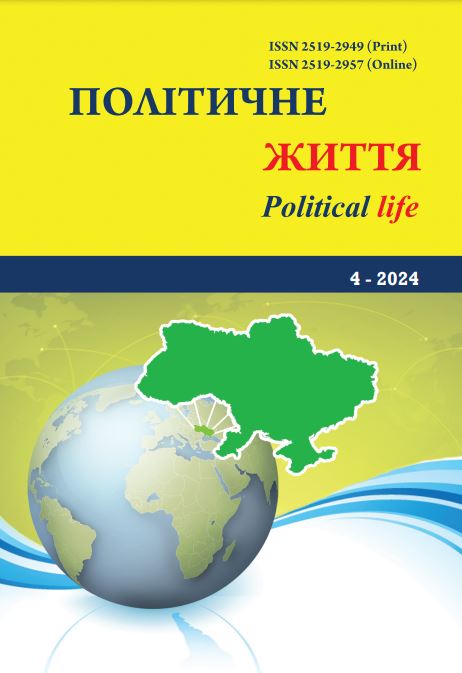Peculiarities of the relationship between the concepts of «Euroscepticism» and «populism»
DOI:
https://doi.org/10.31558/2519-2949.2024.4.14Keywords:
Euroscepticism, corruption, distributive justice, public opinion, European Union, European integration, elections, referendums, reform, political parties, EU supportAbstract
The article examines the concept of “Euroscepticism” in relation to the concept of “populism”. Distributive injustice does not undermine support for European integration in member states with high levels of corruption. It is argued that these cross-national differences in Euroscepticism improve knowledge about the relationship between institutional quality and support for European integration. Party Euroscepticism in Central and Eastern European countries is examined. In an attempt to draw comparative lessons from different cases of Euroscepticism in the party systems of these countries, the relationship between party Euroscepticism and the left and right ideological spectrums, “hard” and “soft” Euroscepticism are examined. It is argued that expanding the scope of the study of Euroscepticism to candidate countries broadens the understanding of Euroscepticism in Western Europe and shapes the understanding of party systems in Central and Eastern Europe. Analyzed from the perspective of the vertical and horizontal dimensions. Thus, for the vertical dimension of populism, the logic of us and those above us is reflected in the opposition of the people to the establishment. The key components of the concept of populism and Euroscepticism are closely related. The peculiarities of the relationship between the concepts of "Euroscepticism" and "populism" are analyzed from the perspective of the vertical and horizontal dimensions. Thus, for the vertical dimension of populism, the logic of us and those above us is reflected in the opposition of the people to the establishment. The political line of Euroscepticism of some parties may be based on the opposition of the establishment, represented by political forces. The horizontal dimension in both cases implies antagonism between us and foreigners; for populism, this can be separation from foreigners, criminals, and illegal migrants; for Euroscepticism, it is distancing from foreigners, non-believers, who, having nothing in common with European traditions and culture, cease to be foreigners due to EU policy.
References
Usherwood, S. & Startin, N. (2013). Euroscepticism as a Persistent Phenomenon. Journal of Common Маркет, Vol. 51, No.1, 10-17.
Hartleb F. (2012). European Project in Danger? Understanding Precisely the Phenomena "Euroscepticsm, Populism and Extremism" в Times of Crisis. Review of European Studies, Vol. 4, No. 5, 42-50.
Farage, N. Big Banks, Big Business and Big Bureaucrats Run the EU. 15.01.2014 URL: http://www.ukipmeps.org/articles_779_Big-Banks-Big-Business-and-Big-Bureaucrats-Run-the- EU Nigel-Farage.html
Corbetta, P. & Vignati R. (2014). Direct Democracy and Scapegoats: the Five Star Movement and Європа. The International Spectator, Vol. 49, No.1, 51-63.
Hartleb, F. A. (2015). Thorn in the Side of European Elites: the New Euroscepticism // Wilfried Martens Centre for European Studies. P. 20. URL: http://www.martenscentre.eu/sites/default/files/publication-files/thorn-side-european-elites-new- euroscepticism.pdf
Levitsky, S., Roberts KM (eds.). (2011) The Resurgence of the Latin American Left. Baltimore: J. Hopkins University Press, 5-18.
Tournier-Sol, K. (2015). Reworking the Eurosceptic and Conservative Traditions в Populist Narrative: UKIP’s Winning Formula? Journal of Common Market Studies, Vol. 53, No. 1, 140-154.
Arter, D. (2010).The Breakthrough of Інші West European Populist Radical Right Party? The Case of the True Finns. Government and Opposition, Vol. 45, No. 4, 487-495.
Mudde, C. (2004).The Populist Zeitgeist. Government and Opposition, Vol. 39. No. 4, 539-554.
Taggart, P. (1997). The Populist Politics of Euroscepticism. EUSA Biennial Conference, URL: http://aei.pitt.edu/2740/1/002543_1.pdf
Gherghina, S., S. Miscoiu, S. Soare (eds.). (2013). Contemporary Populism: a Controversial Concept and its Diverse Forms, Newcastle, Cambridge Scholars Publishing, 207 р.
Couvrat, Ch., J.-Y. Thériault (dir.), (2012). Les formes contemporaines du populisme, Montréal, Athéna, 2014 and also M.-Cl. Esposito et al (dir.), Populismes. L’envers de la démocratie, Paris, Vendémiaire, 235 р.
Dieckhoff, A., in La nation dans tous ses Etats. Les identités nationales en movement. (2000). Paris, Flammarion, 248 р.
Funke, M., M. Schularick, C Trebesch, (2015). Going to Extremes: Politics after Financial Crisis 1870-2014, Center for Economic Studies (CES)/IFO Institute, 188 р.
Reynié, Cf. D. (2011). Populismes : la pente fatale, Plon, 185 р.

